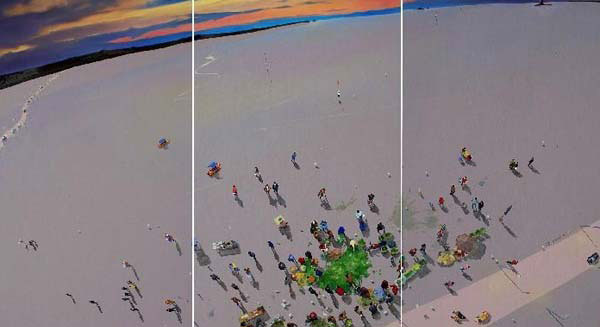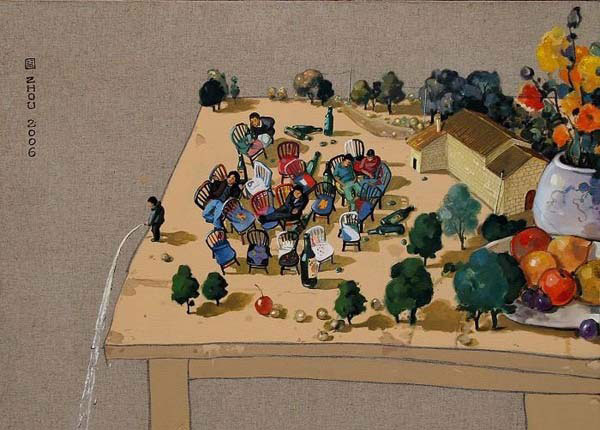·展览城市:香港-香港
·展览时间:2007-02-02~2007-02-28
·开幕酒会:2007-02-01 18:30
·展览地点:少励画廊

展览前言:
Back by popular demand, Schoeni Art Gallery is delighted to present our second solo exhibition of Zhou Jin Hua’s, bringing to you his latest collection. Zhou Jin Hua was born in 1978 and graduated from the Sichuan Academy of Fine Arts in China. Up until this point is his career, Zhou has been greeted with popular acclaim for his large colour fields populated with miniature figures. But now, although still borrowing from the same motifs, his style and palette are markedly different.
Zhou Jin Hua's unique style juxtaposes the avant-garde and the experimental, and his paintings communicate the fragility and vulnerability of our notional existence. Recalling Giacometti's sculptured personages, Zhou Jin Hua's paintings are created out of an aerial transposition of people and their personas. Rather than viewing his figures from a distance so that they are seen on a minute scale, Zhou Jin Hua has drawn closer to his subject. A new interpretation of seeing is relayed, one that travels with our imaginations into the details and mechanics of this miniature world, as it is understood in the artist’s eye. Zhou Jin Hua’s palette is also noticeably more sombre, painting a concrete wasteland that is teeming with the accidental nature of humans and their movement through life.
Although the size and proportion of Zhou Jin Hua’s people may amuse, it is the proportion of commotion that the artist is commenting on. Zhou Jin Hua captures an air of lethargy within the banal in his canvases, but the languid grace of people going through their daily lives is somehow interrupted; the social commentary that Zhou Jin Hua is putting forth is belied by the small scale of his subject’s size. Rather than presenting a coherent sense of community, many of Zhou Jin Hua’s people gather as spectators around a fire or a car crash, instead of actively participating in the suggested drama of the incident in the frame. There is an ascetic tone to the “cuteness” of Zhou Jin Hua’s own Lilliput that makes his painting both a parody and a satire. Also, in his portrayal of mishap and happenstance, Zhou Jin Hua also is referring to European historical events, illuminating that no matter how seemingly small an event may be, there is something more malignant about misadventure or coincidence.
On one canvas, the artist actually juxtaposes his personage against every day objects painted in the tradition of Cézanne’s still-lifes, and the viewer is given a reference from which to measure this smaller world and its population as it travels and exists – in a way it is being measured against our worldly existence, and the physical environment that we choose to surround ourselves with. Zhou Jin Hua’s style is very much informed by his interests in nature and astronomy. His stylistic representation of human beings as "small particles in this enormous universe" compounds a complex understanding of the individual within a collective.
Zhou Jin Hua's tone is somewhat reticent and paced, akin to the movement of his miniature people. Speaking candidly on the philosophy behind his work, Zhou Jin Hua sums it up by saying, “It (art) does not conform to the conventional observation about "Us", neither does it conform to a conventional picture.” In a way, Zhou Jin Hua's work is playing on our notions of sophistication and ego, portraying the reverse as a meme of our own understanding of society and ‘Us’. Within this collection there is a looming conflict, one that brushes up against the artist’s affinity with the absolute nature of science, and how this, like the debate between nature and nurture, has no bearing on politics or society.
Written by Alexandra Hamlyn
